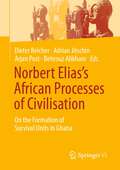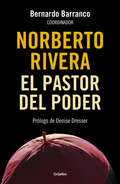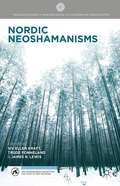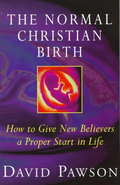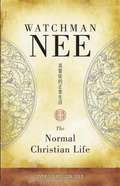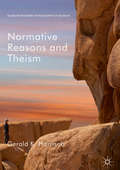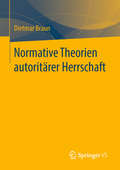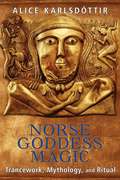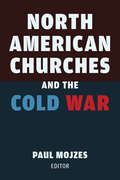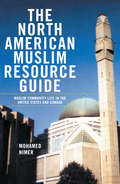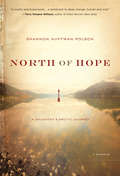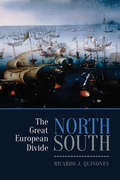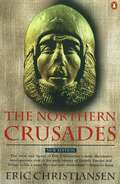- Table View
- List View
Norbert Elias’s African Processes of Civilisation: On the Formation of Survival Units in Ghana
by Barbara Mennell Stephen MennellIn 1962 Norbert Elias was invited as a temporary professor at the University of Ghana in Legon, Accra. He taught, employed fieldwork, travelled, and met many people in postcolonial Africa. When Elias left Ghana in 1964, he had laid the basic groundwork for a fundamental sociological argument on human societies.The volume on hand is a selection of his unpublished writings based on these experiences. Together they touch upon not only the well-known criticism of Eurocentrism and a developmental perspective but also what could be considered the core of Elias’s work: the concept of civilisation. In a foreword, Dieter Reicher and Adrian Jitschin have endeavoured to explain and break down the relations of Elias’s African experience to the rest of his work and biography. They also clarified some misleading interpretations of Elias’s time in Africa. Finally, Arjan Post has uncovered the previously unknown fascinating story of Elias’ encounter with Malcolm X in an epilogue.
Norberto Rivera: El pastor del poder
by Bernardo BarrancoMás que una obra anticlerical o anticatólica, éste es un esfuerzo colectivo por conformar una sólida imputación a una fallida aventura de la Iglesia que apostó por la disciplina y la regresión. Alberto Athié - Eugenia Jiménez Cáliz - Guadalupe Loaeza - Fátima Moneta - Marilú Rojas Salazar - Mónica Uribe - Rodrigo Vera - Jenaro Villamil El libro que tiene en sus manos es una colección de ensayos críticos sobre el desempeño del arzobispo Norberto Rivera. No se busca una falsa neutralidad, por el contrario, son textos de denuncia donde intelectuales, periodistas y activistas de derechos humanos sustentan con hechos los excesos y extravíos del cardenal. Los autores documentan la trayectoria de un personaje que en nombre de la ortodoxia moral ha condenado las causas de las mujeres, los homosexuales, los no creyentes y las minorías. Como sedocumenta a lo largo de estas páginas, Norberto Rivera es un claro ejemplo de que la impunidad y el fuero religioso es una regla no escrita de la política mexicana. El prelado es intocable no sólo por su condición de alto clero, sino por su hermandad con el poder. Más que como pastor o líder espiritual, dice Bernardo Barranco, "el cardenal encarna al obispo sinuoso, rodeado de lujos, protector de pederastas, centavero, solapador a conveniencia propia y de sus amigos: actores de doble moral dentro y fuera de la Iglesia". Otros autores han opinado: "Tantas razones para la desilusión con la cúpula de la Iglesia católica y su representante en México, Norberto Rivera. Y este libro enuncia los motivos de este desencanto, persistente y dolorosamente. Marcial Maciel, pederasta. Juan Pablo II, encubridor. Legionarios de Cristo, cómplices. El personaje principal de esta obra, omiso. Difícil reconocerlo, entenderlo, admitirlo. Pero es la verdad que lleva años allí; que algunas víctimas valientes han denunciado; que algunos escritores comprometidos han investigado; que muchos mexicanos deberían saber." -Denise Dresser-
Nordic Neoshamanisms
by Siv Ellen Kraft Trude Fonneland James R. LewisThis book proposes that the drive for religiosity and experiences of the sacred are far from lost in contemporary western societies. The contributors' objective is to explore the myriad of ways late modern shamanism is becoming more vital and personally significant to people, communities, and economies in Nordic countries.
Norito: A Translation of the Ancient Japanese Ritual Prayers - Updated Edition
by Donald L. PhilippiThis volume presents the only English translation of the prayers of Japan's indigenous religious tradition, Shinto. These prayers, norito, are works of religious literature that are basic to our understanding of Japanese religious history. Locating Donald Philippi as one of a small number of scholars who have developed a perceptive approach to the problem of "hermeneutical distance" in dealing with ancient or foreign texts, Joseph M. Kitagawa recalls Mircea Eliade's observation that "most of the time [our] encounters and comparisons with non-Western cultures have not made all the `strangeness' of these cultures evident. . . . We may say that the Western world has not yet, or not generally, met with authentic representatives of the `real' non-Western traditions." Composed in the stately ritual language of the ancient Japanese and presented as a "performing text," these prayers are, Kitagawa tells us, "one of the authentic foreign representatives in Eliade's sense." In the preface Kitagawa elucidates their significance, discusses Philippi's methods of encountering the "strangeness" of Japan, and comments astutely on aspects of the encounter of East and West.
The Normal Christian Birth: How to Give New Believers a Proper Start in Life
by David PawsonBasing his study on the New Testament, David Pawson advocates a synthesis of the 'liberal' emphasis on repentance, the 'evangelical' on faith, the 'sacramental' on baptism and the 'pentecostal' on the Spirit. He then relates these 'spiritual dooes' to the concepts of conversion and regeneration.The Normal Christian Birth looks at crucial and controversial texts, challenging traditional interpretations. The final section on evangelistic counselling questions the adequacy of the typical 'sinner's prayer' approach. Drawing from scripture and experience, David Pawson gives many practical tips on helping potential discipes to repent, believe, be baptised and receive the Spirit.
The Normal Christian Life
by Watchman NeeThis classic work unfolds the path of faith and presents the eternal purpose of God in simple terms.
Normative Reasons and Theism (Palgrave Frontiers in Philosophy of Religion)
by Gerald K. HarrisonNormative reasons are reasons to do and believe things. Intellectual inquiry seems to presuppose their existence, for we cannot justifiably conclude that we exist; that there is an external world; and that there are better and worse ways of investigating it and behaving in it, unless there are reasons to do and believe such things. But just what in the world are normative reasons? In this book a case is made for believing normative reasons are favouring relations that have a single, external source, filling this significant gap in the literature in an area within contemporary philosophy that has quickly grown in prominence. Providing a divine command metanormative analysis of normative reasons on entirely non-religious grounds, its arguments will be relevant to both secular and non-secular audiences alike and will address key issues in meta-ethics, evolutionary theory - especially evolutionary debunking threats to moral reasons and the normative more generally - and epistemology.
Normative Theorien autoritärer Herrschaft
by Dietmar BraunWährend die normative Begründung von Demokratie seit der Antike ein zentrales Thema der politischen Ideengeschichte darstellt, erhält die Rechtfertigung autoritärer Herrschaft bisher relativ wenig Aufmerksamkeit. Diese Diskrepanz soll mit diesem Buch beseitigt werden. Übersichtsweise werden die relevanten Beiträge politischer Philosophen und Vertreter religiöser und ideologischer Strömungen abgehandelt und zu sieben Autoritätstypen zusammengefasst: den sittlichen, religiösen, schützenden, vernünftigen, ideologischen, elitären und populistischen Autoritarismus.
Norse Goddess Magic: Trancework, Mythology, and Ritual
by Alice KarlsdóttirA practical guide to the magic of the feminine side of the Norse pantheon • Provides invocations and rituals to call each goddess forth for personal and group spirit work • Details the author’s trancework to discover the personalities and powers of Frigg the Allmother, wife of Odin, and the 12 lesser-known Aesir goddesses associated with her • Offers a comprehensive guide to tranceworking to connect with the deities Combining traditional research on folklore and the Eddas with trancework and meditation techniques, Alice Karlsdóttir was able to rediscover the feminine side of the Norse pantheon and assemble working knowledge of 13 Norse goddesses for both group ritual and personal spirit work. Detailing her trancework journeys to connect with the goddesses, the author reveals the long-lost personalities and powers of each deity. She explores the Norse goddess Frigg the Allmother, wife of Odin, along with the 12 Asynjur, or Aesir goddesses, associated with her, such as Sjofn the peacemaker, Eir the Healer, and Vor the Wisewoman. She shares their appearances in the Eddas and Germanic mythology and explains the meanings of their names, their relationships to each other, and their connections to the roles of women in Old Norse society. She provides detailed instructions for invocations and rituals to call each goddess forth for personal and group spirit work. She also offers a comprehensive guide to ritual tranceworking to allow anyone to directly experience deities and spiritual beings and develop spirit-work relationships with them.
The Norse Shaman: Ancient Spiritual Practices of the Northern Tradition
by Evelyn C. RysdykAn experiential guide to the wisdom preserved in Europe’s far north• Includes shamanic journeys to connect with deities and your ancestral shamans• Provides step-by-step instructions to prepare for and conduct a seiðr ceremony• Draws on archaeological evidence and surviving written records from Iceland• Reveals the long tradition of female shamans in northern European shamanismShamanism is humanity’s oldest spiritual tradition. In much of the Western world, the indigenous pre-Christian spiritual practices have been lost. Yet at the northern fringes of Europe, Christianity did not displace the original shamanic practices until the end of the Viking age. Remnants of Norse shamanic spirituality have survived in myths, folk traditions, and written records from Iceland, providing many clues about the ancient European shaman’s world, especially when examined in conjunction with other shamanic cultures in northern Eurasia, such as the Sami and the tribes of Siberia.Reconstructing the shamanic practices of the hunter-gatherers of Scandinavia, Evelyn Rysdyk explores the evolution of Norse shamanism from its earliest female roots to the pre-Christian Viking Age. She explains how to enter Yggdrasil, the World Tree, to travel to other realms and provides shamanic journeys to connect with the ancestral shamans of your family tree, including the Norse goddess Freyja, the very first shaman. She offers exercises to connect with the ancient goddesses of fate, the Norns, and introduces the overnight wilderness quest of útiseta for reconnecting with the powers of nature. She explains the key concepts of Ørlög and Wyrd--the two most powerful forces that shape human lives--and provides exercises for letting go of harmful behavior patterns and transforming simple knowledge into profound wisdom by connecting with Óðinn.Thoroughly examining the shamanic rituals of seiðr, the oracular magic of the Nordic cultures, the author provides step-by-step instructions to prepare for and conduct a seiðr ceremony, including creating your own seiðr staff and hood, and explores the ancestral use of shamanic songs or varðlokur to accompany the ceremony. Woven throughout these exercises, Rysdyk provides archaeological evidence from Neolithic sites supporting the long tradition of venerating wise women, grandmothers, and mothers in ancient cultures and the important role of female shamans at the heart of northern European shamanism. Providing an accessible guide for anyone trying to fulfill their shamanic callings, these powerful rituals can provide personal healing and a clear path for finding our way into a harmonious relationship with the natural world.
North American Churches and the Cold War
by Paul MojzesHistory textbooks typically list 1945–1990 as the Cold War years, but it is clear that tensions from that period are still influencing world politics today. While much attention is given to political and social responses to those first nuclear threats, none has been given to the reactions of Christian churches. North American Churches and the Cold War offers the first systematic reflection on the diverse responses of Canadian and American churches to potential nuclear disaster.A mix of scholars and church leaders, the contributors analyze the anxieties, dilemmas, and hopes that Christian churches felt as World War II gave way to the nuclear age. As they faced either nuclear annihilation or peaceful reconciliation, Christians were forced to take stands on such issues as war, communism, and their relationship to Christians in Eastern Europe. As we continue to navigate the nuclear era, this book provides insight into Chris-tian responses to future adversities and conflicts.CONTRIBUTORS William Alexander Blaikie James Christie Nicholas Denysenko Gary Dorrien Mark Thomas Edwards Peter Eisenstadt Jill K. Gill Michael Graziano Barbara Green Raymond Haberski Jr. Jeremy Hatfield Gordon L. Heath D. Oliver Herbel Norman Hjelm Daniel G. Hummel Dianne Kirby Leonid Kishkovsky Nadieszda Kizenko John Lindner David Little Joseph Loya Paul Mojzes Andrei V. Psarev Bruce Rigdon Walter Sawatsky Axel R. Schäfer Todd Scribner Gayle Thrift Steven M. Tipton Frederick Trost Lucian Turcescu Charles West James E. Will Lois Wilson
North American Churches and the Cold War
by Paul MojzesHistory textbooks typically list 1945–1990 as the Cold War years, but it is clear that tensions from that period are still influencing world politics today. While much attention is given to political and social responses to those first nuclear threats, none has been given to the reactions of Christian churches. North American Churches and the Cold War offers the first systematic reflection on the diverse responses of Canadian and American churches to potential nuclear disaster.A mix of scholars and church leaders, the contributors analyze the anxieties, dilemmas, and hopes that Christian churches felt as World War II gave way to the nuclear age. As they faced either nuclear annihilation or peaceful reconciliation, Christians were forced to take stands on such issues as war, communism, and their relationship to Christians in Eastern Europe. As we continue to navigate the nuclear era, this book provides insight into Chris-tian responses to future adversities and conflicts.CONTRIBUTORS William Alexander Blaikie James Christie Nicholas Denysenko Gary Dorrien Mark Thomas Edwards Peter Eisenstadt Jill K. Gill Michael Graziano Barbara Green Raymond Haberski Jr. Jeremy Hatfield Gordon L. Heath D. Oliver Herbel Norman Hjelm Daniel G. Hummel Dianne Kirby Leonid Kishkovsky Nadieszda Kizenko John Lindner David Little Joseph Loya Paul Mojzes Andrei V. Psarev Bruce Rigdon Walter Sawatsky Axel R. Schäfer Todd Scribner Gayle Thrift Steven M. Tipton Frederick Trost Lucian Turcescu Charles West James E. Will Lois Wilson
The North American Muslim Resource Guide: Muslim Community Life in the United States and Canada
by Mohamed NimerThis useful resource provides basic information about Islamic life in the United States. Coverage includes population statistics and analysis, as well as immigration information that tracks the settlement of Islamic people in the America. The guide contains contact information for mosques, community organizations, schools, women's groups, media, and student groups. Recent Islamic-American events over the past five years are also reviewed.To see the Introduction, the table of contents, a generous selection of sample pages, and more, visit the The North American Muslim Resource Guide website.
North Country Dad
by Lois RicherThe Mommy Plan Widower Grant Adams loves his twin stepdaughters, but what does he know about pigtails and dresses and being a full-time dad? With his new job in a remote Canadian center for troubled boys, Grant needs a good nanny. But when he meets Dahlia Wheatley, who's loving, patient and kind to his girls, he realizes the twins need more than a sitter-they need a mother. With her own harrowing past, Dahlia is as reluctant to get emotionally involved as Grant is. Yet his startling proposition just may form a happy new family of four. Northern Lights: On the edge of the Arctic, love awaitsWidower Grant Adams loves his twin stepdaughters, but what does he know about pigtails and dresses and being a full-time dad? With his new job in a remote Canadian center for troubled boys, Grant needs a good nanny. But when he meets Dahlia Wheatley, who's loving, patient and kind to his girls, he realizes the twins need more than a sitter-they need a mother. With her own harrowing past, Dahlia is as reluctant to get emotionally involved as Grant is. Yet his startling proposition just may form a happy new family of four. Northern Lights: On the edge of the Arctic, love awaits
North Country Family
by Lois RicherMaking Amends After losing his clients' life savings, former broker Rick Salinger went in search of redemption. Now a pastor in the remote Canadian town of Churchill, he focuses on his congregation and working with the kids at a center for troubled boys. But when the center's new nurse arrives with her own struggling son, Rick fears getting too close. Widowed mom Cassie Crockett once lost almost everything because of Rick-and he's not sure she'll ever forgive him. Yet he can't stop his growing feelings for her. He wants to help Cassie and her son build a new life...one that just might include him. Northern Lights: On the edge of the Arctic, love awaits
North Country Hero
by Lois RicherThe Soldier's Homecoming Back home to heal, army veteran Kyle Loness can't wait to leave the town that holds such sad memories. He never expects beautiful newcomer Sara Kane to enlist his help with the town's new youth center. What does he know about helping kids? But the more time he spends with the troubled teens-and Sara-the more the jaded soldier feels his defenses crumbling. It might take Sara-and the kids-to open his guarded heart to love again. Northern Lights: On the edge of the Arctic, love awaits.
North Country Hero & North Country Family: A 2-in-1 Collection
by Lois RicherLove on the edge of the Arctic.North Country HeroArmy veteran Kyle Loness can’t wait to leave the town that holds such sad memories. He never expects newcomer Sara Kane to enlist his help with the town’s new youth center. What does he know about helping kids? But the more time he spends with the troubled teens—and Sara—the more the jaded soldier feels the defenses around his guarded heart begin to crumble…North Country FamilyAfter losing his clients’ life savings, former broker Rick Salinger went in search of redemption. Now a pastor in the remote Canadian town of Churchill, he focuses on his congregation and working with the kids at a center for troubled boys. But when widowed mom Cassie Crockett arrives with her son, Rick fears getting too close. Cassie lost almost everything because of Rick…and he’s not sure she’ll ever forgive him.
North Country Mom
by Lois RicherSecond Chances Detective Jack Campbell needs a fresh start. So he quits his job, packs up his house and his daughter and heads north to Manitoba, Canada. But his daughter, Giselle, is miserable, and will only talk to local shop owner Alicia Featherstone. Her kindness to his daughter does not go unnoticed by Jack, and soon the relationship between father and daughter isn't the only thing Alicia's helping to heal. He's quickly falling for sweet Alicia. But when her past threatens their future together, can he learn to trust enough to make them a permanent family?
North of Hope
by Jon HasslerHailed by The New York Times Book Review as a “writer good enough to restore your faith in fiction,” Jon Hassler has established himself as a contemporary literary master. With North of Hope, he surpasses his own previous work, both in scope and intensity. Set in the scrubby, jackpine-speckled landscape of northern Minnesota—a place that will have a profound effect on the characters’ lives—this beautifully written, deeply moving novel is the crowning achievement of an already distinguished career. After more than twenty years in the priesthood, Father Frank Healy is going home. Emulating the hero of his youth, a nineteenth-century missionary named Father Zell, Frank is bringing Catholicism to the Ojibway Indians living on the Basswood reservation in the north woods. But what Father Healy finds when he arrives at the battered Church of Our Lady are very few believers and a woman from his past—the woman from his past—whom he thought he’d never see again. Frank thought Libby Girard more beautiful than Jennifer Jones when he first laid eyes on her in the Royal movie theater in 1949. In the intervening years, Libby has been chasing after the happy family life she never had in her violent childhood home, and her search for love has born bitter fruit: a crumbling marriage to a doctor named Tom Pearsall and her daughter Vema, a wild young woman with a long history of crippling mental illness. It is clear to Frank that Libby’s life is unraveling. And as she slowly becomes dependent on him, the lives around them erupt in a tangle of drugs and despair, alcoholism and death. In North of Hope, Jon Hassler has written with great sensitivity about the divinity of the human spirit, and how faith can ennoble the most hopeless life. The Cleveland Plain Dealer has proclaimed Hassler “one of America’s most completely satisfying novelists,” and North of Hope is his most completely satisfying, and thoroughly realized novel.
North of Hope: A Daughter's Arctic Journey
by Shannon PolsonAfter author Shannon Huffman Polson’s parents are killed by a wild grizzly bear in Alaska’s Arctic, her quest for healing is recounted with heartbreaking candor in North of Hope. Undergirded by her faith, Polson’s expedition takes her through her through the wilds of her own grief as well as God’s beautiful, yet wild and untamed creation—ultimately arriving at a place of unshaken hope. She travels from the suburbs of Seattle to the concert hall, performing Mozart’s Requiem with the Seattle Symphony, to the wilderness of Alaska—where she retraces their final days along an Arctic river. This beautifully written book is for anyone who has experienced grief and is looking for new ways to understand overwhelming loss. Readers will find empathy and understanding through Polson’s journey. North of Hope is also for those who love the outdoors and find solace and healing in nature, as they experience Alaska’s wild Arctic through the author’s travels.
North! Or Be Eaten: (Wingfeather Series 2) (Wingfeather series #2)
by Andrew PetersonJanner, Tink and Leeli thought they were normal children, but now they know they're really the lost Jewels of Anniera, heirs to a legendary kingdom across the sea, and suddenly everyone wants to kill them. In order to survive they must flee to the safety of the Ice Prairies. First, however, they have to escape the monsters of Glipwood Forest, the thieving Stranders of the East Bend and the dreaded Fork Factory.But even more dangerous are the jealousy and bitterness that threaten to tear them apart, and Janner and his siblings must learn the hard way that the love of a family is more important than anything else.
North! Or Be Eaten: (Wingfeather Series 2) (Wingfeather series)
by Andrew PetersonThe adventure continues in The Wingfeather Saga! A brand new recording, narrated by the author. Janner, Tink and Leeli thought they were normal children, but now they know they're really the lost Jewels of Anniera, heirs to a legendary kingdom across the sea, and suddenly everyone wants to kill them. In order to survive they must flee to the safety of the Ice Prairies. First, however, they have to escape the monsters of Glipwood Forest, the thieving Stranders of the East Bend and the dreaded Fork Factory.But even more dangerous are the jealousy and bitterness that threaten to tear them apart, and Janner and his siblings must learn the hard way that the love of a family is more important than anything else.*This audiobook includes a PDF of maps, illustrations, and more.(P)2021 Penguin Random House Audio
North/South: The Great European Divide
by Ricardo J. QuinonesThe division of European society and culture along a North/South axis was one of the most decisive and enduring developments in the modern world. In North/South, which completes a trilogy of works devoted to the study of the mind and body of Europe, Ricardo J. Quinones examines the momentous early modern origins of this division. Quinones focuses on four concepts connected with the Protestant Reformation whose emergence defines the rise of the North and the subjugation of the South: Christian liberty, skepticism, tolerance, and time. Tracing their influence through the political and philosophical conflicts of the era and forward into the Enlightenment, he suggests that they constitute the basis of Europe's transformation between the sixteenth century and the dawn of the industrial revolution.A fascinating combination of cultural and intellectual history, philosophy, and comparative literature written in the vein of Quinones' award-winning Dualisms, this work, called "dazzling" by one critic, shows a contemporary pertinence with the relapse of the South into the subordinate position which it was thought to have overcome.
North to the Night: A Spiritual Odyssey in the Arctic
by Alvah SimonIn June 1994 Alvah Simon and his wife, Diana, set off in their 36-foot sailboat to explore the hauntingly beautiful world of icebergs, tundra, and fjords lying high above the Arctic Circle. Four months later, unexpected events would trap Simon alone on his boat, frozen in ice 100 miles from the nearest settlement, with the long polar night stretching into darkness for months to come. With his world circumscribed by screaming blizzards and marauding polar bears and his only companion a kitten named Halifax, Simon withstands months of crushing loneliness, sudden blindness, and private demons. Trapped in a boat buried beneath the drifting snow, he struggles through the perpetual darkness toward a spiritual awakening and an understanding of the forces that conspired to bring him there. He emerges five months later a transformed man. Simon's powerful, triumphant story combines the suspense of Into Thin Air with a crystalline, lyrical prose to explore the hypnotic draw of one of earth's deepest and most dangerous wildernesses.
The Northern Crusades
by Eric ChristiansenThe 'Northern Crusades', inspired by the Pope's call for a Holy War, are less celebrated than those in the Middle East, but they were also more successful: vast new territories became and remain Christian, such as Finland, Estonia and Prussia. Newly revised in the light of the recent developments in Baltic and Northern medieval research, this authoritative overview provides a balanced and compelling account of a tumultuous era.
